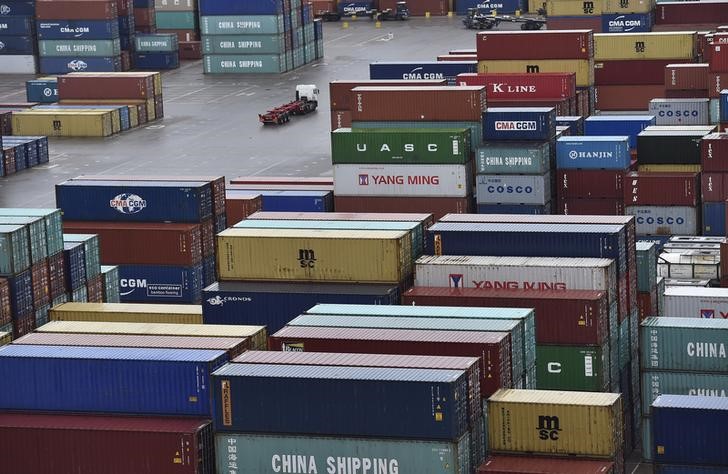By Andy Bruce and William Schomberg
LONDON (Reuters) - Britain's economy expanded at a faster pace than previously thought at the end of last year, helped by strong growth in exports, a boost for Prime Minister David Cameron before a national election on May 7.
Finance minister George Osborne also seized on data on Tuesday that showed household incomes rising at the fastest annual pace in more than four years.
But policymakers hoping for a more balanced economic recovery will be disappointed by a 0.9 percent fall in business investment during the fourth quarter compared with the July-September period. Still, for 2014 as a whole business investment rose 7.5 percent, the best showing since 2007.
Gross domestic product between October and December grew by a quarterly 0.6 percent, the Office for National Statistics said. That compared with 0.5 percent in a previous reading and matched the third quarter when growth was revised down a bit.
Sterling rose against the euro after the data, and British government bond prices slipped briefly.
For 2014 as a whole, GDP grew 2.8 percent, revised up from a previous estimate of 2.6 percent for its strongest pace of growth since 2006.
Alan Clarke, an economist with Scotiabank, said the big picture for Britain, which grew faster than any other developed economy last year, was positive.
But he saw signs of a slowdown in early 2015 after separate data from the ONS showed a fall in output in the dominant services industry in January.
"We could get 0.4 percent quarterly growth in the first quarter and that would be announced just a week before the election," he said.
The ONS said the biggest contribution to quarterly growth in the last three months of 2014 came from trade which added 0.9 percentage points -- a sharp swing from the 0.5 percentage point drag in the third quarter.
That helped to narrow Britain's current account deficit in the fourth quarter after matching its highest level on record in the previous three months.
But for 2014 as a whole, the shortfall widened to 5.5 percent of GDP, the largest deficit since records began in 1948.
Household spending, the main driver of Britain's economic recovery, added 0.4 percentage points to growth in the quarter, slowing slightly from the third.
Real household disposable income increased 2.3 percent compared with a year ago, the fastest rate of annual growth since the start of 2010, helped by a pickup in wages and a sharp fall in inflation as global oil prices tumbled.

But the ONS also said on Tuesday that GDP per head remained 1.2 percent lower than before the financial crisis, despite overall economic output being nearly 4 percent higher. The difference is largely due to population growth.